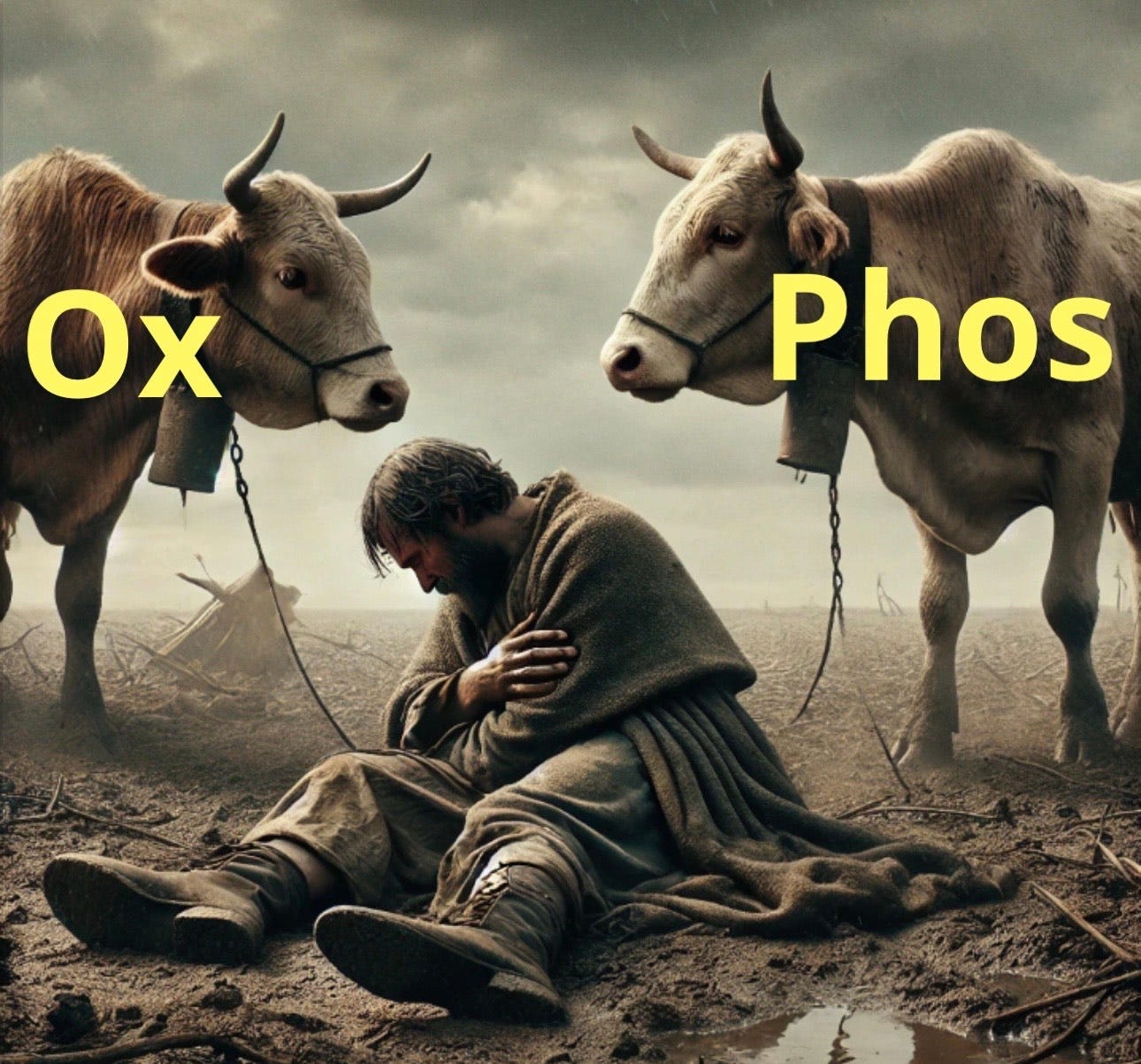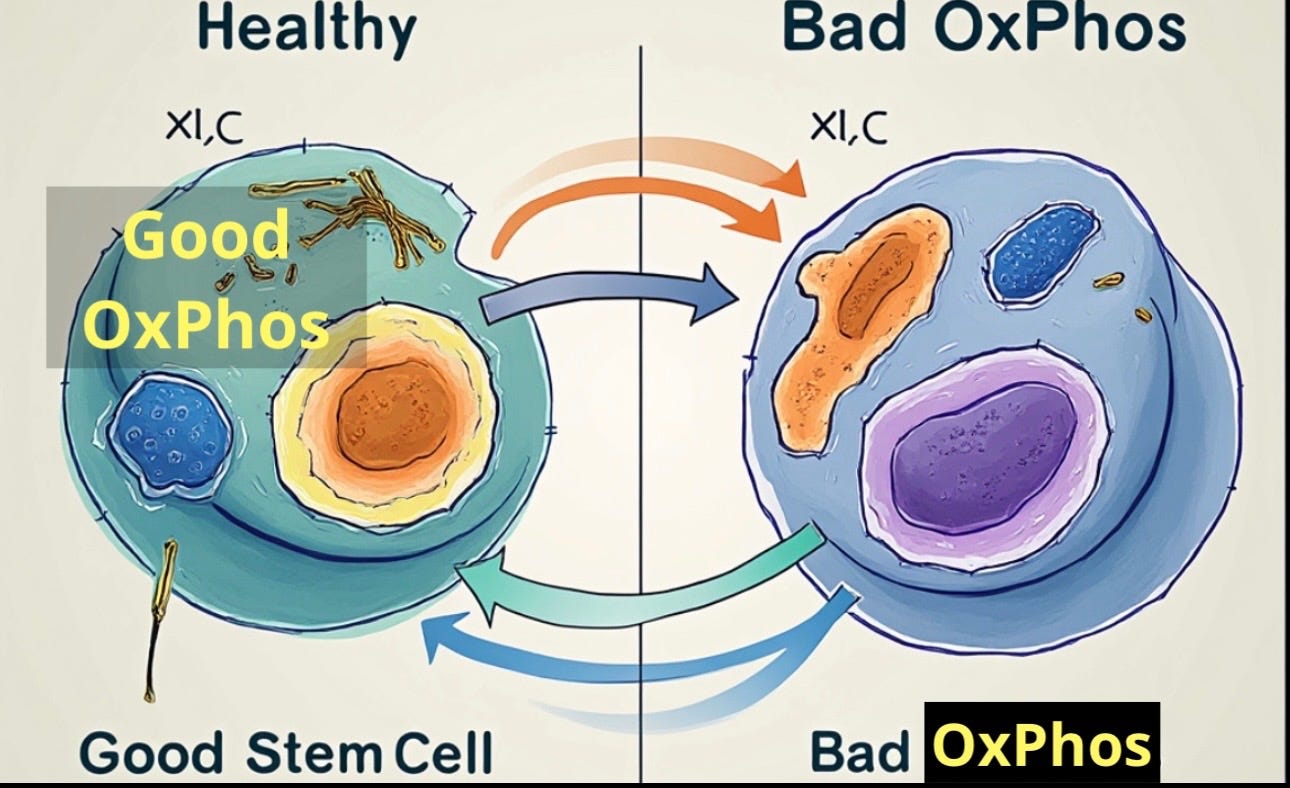Taking A Bite Out Of Cancer - Part One
New Ivermectin, Fen Ben Combination Therapy Shows Promise
A new scientific paper has been published in the Journal of Orthomolecular Medicine on the benefits of Ivermectin and Fen Ben in combination with other effective drugs against cancer.
https://isom.ca/wp-content/uploads/2024/09/Targeting-the-Mitochondrial-Stem-Cell-Connection-in-Cancer-Treatment-JOM-39.3.pdf
Here is the ChatGPT 4.0 Summary
Key points:
Mitochondrial impairment is central to cancer initiation, making it a critical therapeutic target.
Cancer cells heavily depend on glucose and glutamine due to dysfunctional mitochondria.
Vitamin C shows significant cytotoxic effects against cancer cells and reduces metastasis.
Vitamin D enhances mitochondrial function and reduces cancer incidence and metastasis.
Zinc protects mitochondria from oxidative damage and enhances apoptosis in cancer cells.
Ivermectin induces autophagy and apoptosis of cancer cells, showing efficacy in reducing tumor size.
Fasting and ketogenic diets are effective in inhibiting the primary energy pathways that cancer cells rely on.
Exercise increases mitochondrial respiration and can inhibit cancer progression.
Hyperbaric oxygen therapy (HBOT) works synergistically with ketogenic diets to suppress tumor growth.
The paper centers around a process called Oxidative Phosphorylation, which is abbreviated as OxPhos.
The key to the paper is the mitochondrial theory of cancer, which explains that mitochondria are the power plant of eukaryotic cells, which include plant, animal, and human cells. Here is the ChatGPT explanation of the mitochondrial theory of cancer.
The mitochondrial theory of cancer presented in the paper revolves around the Mitochondrial-Stem Cell Connection (MSCC), which integrates insights from the metabolic theory of cancer and the cancer stem cell (CSC) theory. The key premise of this theory is that cancer originates from chronic insufficiency in oxidative phosphorylation (OxPhos) in one or more stem cells. This insufficiency impairs the normal functioning of mitochondria, leading to the formation of cancer stem cells (CSCs), which are the drivers of tumorigenesis.
Key Elements of the Mitochondrial Theory of Cancer:
OxPhos Dysfunction: The initial trigger for cancer is the malfunction of the mitochondria’s energy-producing system, OxPhos. This results in an energy crisis in stem cells, forcing them to rely on less efficient energy pathways, such as glycolysis and glutaminolysis.
Using the car analogy, if your car engine is performing well, it doesn’t accumulate impurities like a poorly performing car engine.
Formation of Cancer Stem Cells (CSCs): Due to impaired mitochondrial function, stem cells become cancerous. These CSCs can drive tumor growth and are also responsible for cancer recurrence and metastasis.
Dependence on Fermentable Fuels: Since cancer cells (especially CSCs) cannot rely on normal mitochondrial respiration, they depend heavily on fermentable fuels, namely glucose and glutamine, to survive and proliferate.
Metastasis Mechanism: The theory also ties mitochondrial dysfunction to metastasis, suggesting that CSCs can fuse with macrophages (immune cells), enabling them to spread to other parts of the body. This fusion contributes to the invasive and metastatic capabilities of cancer.
Mitochondrial Impairment in Tumor Microenvironment: The tumor microenvironment is described as a reflection of mitochondrial impairment, characterized by low pH (acidity), hypoxia, and increased oxidative stress, all of which facilitate tumor growth and metastasis.
Distinction from Other Theories:
Unlike the somatic mutation theory (SMT), which views cancer primarily as a genetic disease driven by mutations, the mitochondrial theory places metabolic dysfunction at the center of cancer development. Standard therapies targeting mutations (like chemotherapy) do not restore OxPhos and can actually worsen mitochondrial dysfunction.
Implications for Therapy:
Restoring mitochondrial function is seen as critical for preventing the formation and growth of CSCs. By enhancing OxPhos and reducing the reliance on glycolysis and glutaminolysis, therapies can more effectively target the root of cancer development.
ChatGPT rending of an OxPhos Tune-Up.
The paper advocates for a hybrid orthomolecular protocol that focuses on boosting mitochondrial health, using substances like vitamin C, vitamin D, and zinc, along with dietary interventions such as ketogenic diets and fasting.
In summary, the mitochondrial theory of cancer posits that cancer is primarily a metabolic disease rooted in mitochondrial dysfunction. This dysfunction leads to the formation of highly tumorigenic cancer stem cells and an energy crisis that cancer cells overcome by relying on fermentable fuels. Therefore, targeting mitochondrial function offers a promising approach to cancer treatment.
Here is the ChatGPT summary of the drug protocol.
The hybrid orthomolecular protocol outlined in the paper includes several repurposed drugs, orthomolecules, and additional therapies that target the Mitochondrial-Stem Cell Connection (MSCC) in cancer treatment. These drugs are selected for their ability to enhance oxidative phosphorylation (OxPhos), reduce the availability of glucose and glutamine (primary fuels for cancer cells), and target cancer stem cells (CSCs) and metastasis.
As a human stem cell, it is like a student that can become one of many different professions through a process known as differentiation.
Key Drugs in the Protocol:
Ivermectin:
Mechanism: Originally an anti-parasitic drug, ivermectin exhibits anti-cancer properties by inducing autophagy and apoptosis in cancer cells. It targets mitochondria, inhibits glycolysis, and has a pro-oxidant effect on cancer cells.
Dosing:
Low-grade cancers: 0.5 mg/kg, 3 times a week.
Intermediate-grade cancers: 1 mg/kg, 3 times a week.
High-grade cancers: Up to 2 mg/kg/day.
Effectiveness: Shown to reduce tumor size and inhibit CSCs in various cancers like breast and pancreatic cancer.
Benzimidazoles (Mebendazole and Fenbendazole):
Mechanism: These drugs, typically used as anti-parasitics, disrupt microtubule function in cancer cells, induce apoptosis, and inhibit glucose and glutamine metabolism. They also target CSC-related pathways and metastases.
Dosing:
Low-grade cancers: Mebendazole 200 mg/day.
Intermediate-grade cancers: Mebendazole 400 mg/day.
High-grade cancers: Mebendazole 1,500 mg/day or Fenbendazole 1,000 mg, 3 times a week.
Effectiveness: Used in cancer types like gastric, colorectal, and glioblastoma.
DON (6-diazo-5-oxo-L-norleucine):
Mechanism: DON is a glutamine antagonist that inhibits glutaminolysis (a key energy pathway in cancer cells), induces apoptosis, and targets CSCs.
Dosing: Administered intravenously or orally, typically between 0.2 to 1.1 mg/kg daily, depending on patient tolerance and cancer grade.
Effectiveness: Especially potent in cancers dependent on glutamine, often used in conjunction with other therapies.
Supporting Orthomolecules:
Vitamin C (Intravenous):
Mechanism: Vitamin C enhances mitochondrial function, induces apoptosis in cancer cells, and specifically targets cancer stem cells (CSCs). It can reduce oxidative stress and tumor size.
Dosing: 1.5 g/kg/day, 2-3 times per week.
Effectiveness: More effective than chemotherapy in some cancer types (e.g., pancreatic cancer) when used intravenously.
Vitamin D (Oral):
Mechanism: Improves mitochondrial respiration, targets CSCs, and reduces glycolysis and glutaminolysis.
Dosing:
High doses (50,000 IU/day) for patients with vitamin D levels ≤ 30 ng/mL.
Maintenance doses around 5,000 IU/day once sufficient levels are reached (80 ng/mL).
Effectiveness: Shown to reduce cancer mortality and inhibit metastasis.
Zinc:
Mechanism: Protects mitochondria from oxidative damage, induces apoptosis in cancer cells, and suppresses CSCs.
Dosing: 1 mg/kg/day, with maintenance after achieving serum levels of 80-120 μg/dL.
Effectiveness: Zinc deficiency is linked to increased cancer risk, and supplementation enhances sensitivity to chemotherapy.
Additional Considerations:
Ketogenic Diet: Promotes metabolic ketosis to inhibit cancer cell energy pathways (glycolysis and glutaminolysis), restricts glucose and glutamine fuels for cancer cells, and increases OxPhos.
Fasting: Induces autophagy, enhances mitochondrial function, and leads to CSC death by depriving them of glucose.
Hyperbaric Oxygen Therapy (HBOT): Reverses tumor hypoxia, enhances mitochondrial function, and synergizes with metabolic therapies like ketogenic diets to suppress tumor growth.
Conclusion:
The drugs and orthomolecules in this protocol work together to target cancer cells by improving mitochondrial function, inhibiting cancer cell metabolism, and eliminating CSCs. These therapies, including Ivermectin, Benzimidazoles, and DON, are combined with Vitamin C, Vitamin D, Zinc, and lifestyle interventions like ketogenic diets and fasting to create a comprehensive cancer treatment strategy.
Disclaimer - I am not a doctor, and the visualization presented here are only memory aids to help the reader take away the key points from the research paper.














here is a comment from a longtime subscriber who wishes to remain anonymous.
Hi, George!
Your show with Peter yesterday was really amazing! Peter seemed to be so excited about the publishing of his new book, and you were there to support him every step of the way.
Looking back, George, as the days and years have gone by, you have always “been there” to help the people with whom you have been connecting. Your national and international audience members have been inspired as they have enjoyed seeing your very generous spirit in action, George. For just a few highlights:
You helped Jason to reach many more viewers on his channel as you invited your audience members to join you both on your very exciting adventures together.
You generously donated to Lee’s citizen journalism scholarship program, as you were spotlighting his academy.
You made a generous donation to help Robert David Steele.
You collaborated with Taskforce in your mutual investigations.
You helped John to establish his channel
You helped Mark to establish his channel
You helped the Neighborhood News Team to establish their organization.
You helped Addy to further his career and you helped him to increase his earnings.
You collaborated with Paul, you helped him to reach more viewers on his channel, and you helped him to navigate through his academic twists and turns.
You helped Tommy to reach more viewers on his channel.
You have made more appearances than any other guest on Jesse’s Missing Link show, and you have helped Jesse to reach more viewers on his channel.
You helped your friend to receive her transplant.
You have been helping
the Breggins and Dr. Ruby as they have had to endure the injustices of tactical lawfare.
You helped Karma Doc through a horrifically devastating time in her life, and you helped her to restore her family farm.
You are helping Veterans with therapy horses—including “Sterne the anthrax horse.”
You have been helping Peter to reach more viewers on his channel with your awesome 3 X per week show.
And yesterday you helped Peter to introduce his first book. It was really great fun for your audience members to watch yesterday’s show, George, and to share in all of the excitement going on there!
Rock on, George!
You’re The Greatest!
God bless you!
Thanks George! More people need to know about this.